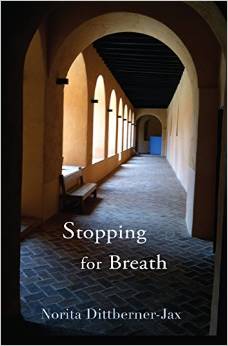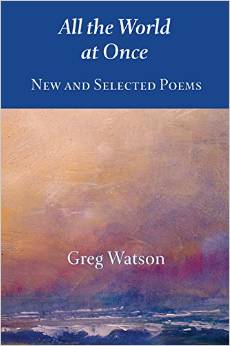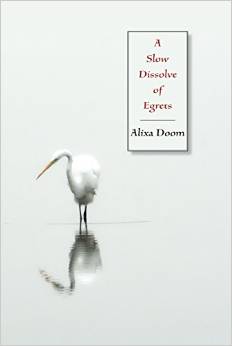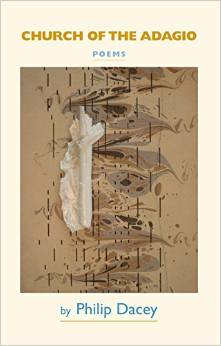Books
Spring Poetry Reviews
For the past fifty years or so American poetry has been more or less in the same holding pattern, publishing collections of short, free verse poems informed by the poet’s personal experience; it’s a poetry of small moments and epiphanies. The influences of Modernism—experimentation, fragmentation, progressivism—now seem to be on the wane. The older doctrine of Romanticism, however, with its emphasis on sentiment and nature and Blake and Shelley’s vision of the poet as an oracle and a sage, still retains a ghostly presence, as evident in four recent collections by Minnesota poets.

I’ve left behind
the small rooms
of my life.
I slip through the great hall,
a pilgrim
Norita Dittberner-Jax writes in “Art Museum”, a poem from her new book Stopping for Breath (Nodin Press). Stopping for Breath is in some ways a follow-up to The Watch; the collection is suffused with memories from a richly-lived life, with titles like “Family Album”, “The Only Thing that Happened in 4th Grade”, and “Sister”.
Dittberner-Jax has a soft and understated talent for lyricism, reminiscent of Mary Oliver. In the picturesque “Superior at the Shoreline: February”, she sees
the rocks on which you stood as a girl,
stunned by its fierce rhythm,
in love with it, as young girls love
the galloping horse.
Ekphrastic poems, odes to trees (and a new bed from IKEA) and travel pieces are also scattered among the pages of Stopping for Breath. Its finest moments however are in the short poems (typically the last in each of the book’s eight sections) where Dittberner-Jax steps outside of the circle of her own life and views “the great hall” around her with a transcendental clarity. Here, for example, is the poem “Evening” in its entirety:
Sweetness of lilac in the empty schoolyard
First cut of grass, blades lifted
by a wind, soft as an arm
around my shoulder.
It is as if, in these short and fragmentary pieces (“Holding the Moment”, “Morning”, “I Keep Them Close”) Dittberner-Jax is asking us, the reader, to stop for breath, while “the east side of everything illuminated.” In “I Write” Dittberner-Jax tells us she writes “for the moments when I step into a pool of light / and know it”—and reading Stopping for Breath, we step into that same light.

Another Nodin Press release is collection of new and selected poems by Greg Watson, All the World at Once. Since the late ‘90s Watson has quietly published beautiful, effervescent poetry from his home in St. Paul. He has a magical way of turning ordinary moments of the ordinary world—with its hands, wrinkles, rain, empty rooms—into something timeless and filled with splendor. His best poems achieve a sort of free-fall, with lines coming unexpectedly from every direction and leading to “a somewhere not quite,” both familiar and strange. Take, for instance, the brooding “Pastoral”:
Then the postman arrived with the month
of November, everything
suddenly gray as snakestone.
The women covered their flesh, the leaves
shook hands with the devil.
Watson seems to keep his own life at arm’s length from his poetry; other than a few elegiac poems to a brother who died young, no particular personage or history confront us in All the World at Once, though a nebulous “she” often appears, as in the gorgeous “Washing Her Hair”, where he lathers
her wet tangles of hair,
small bells of water
on shoulder and neck
drinking the light
one by one, as she smiles
knowingly
Perhaps the magic in Watson’s poetry lies in the very fact that it is not tied to him—any one of us could find ourselves in the middle of one of his poems, on any given day.

Alixa Doom is a more recent arrival to the Twin Cities poetry scene; her first book, A Slow Dissolve of Egrets (Red Dragonfly Press), incorporates her celebrated chapbook “Cedar Crossings” along with poems of a more personal nature. Doom may have taken cues from her writing mentors to mine her own life for poetic material, but in her case the confessional tone seems rather forced. Poems like “Belgian Grandmothers”, “Snorkeling in the Caribbean” and “After Lasik Surgery” feel almost like notes the poet has written to herself. Much finer are the pieces is in which she observes nature, as the egret in “October”:
At the water’s edge the egret,
steeped in a white meditation
that I approach too loudly, lifts
the long sleds of its wings and
glides into perfect oblivion.
And her “Swan Migration” recalls Yeats’ “Wild Swans at Coole”:
Arcs of white necks exchanging places,
they drift from shore to shore,
bearing the body
as if it were the soul.
Doom’s partner, meanwhile, Philip Dacey, remains prolific as ever, and some lines from his latest collection, Church of the Adagio (Rain Mountain Press), are even quoted in A Slow Dissolve of Egrets (there seems to be a lover’s quarrel regarding the final resting place for his ashes).

Of the four poets reviewed here, Dacey departs the most from the standard of contemporary poetry, writing in free verse or rhyme and meter on a dizzying array of topics, including (but not limited to) escaped llamas, Juilliard musicians, typos found in letters, and procuring tea and honey for Allen Ginsberg before a reading. While I audibly shouted “Bravo!” on seeing Dacey toss off a triolet or sestina, I found Church of the Adagio an uneven read. The better poems, like “The Abyss Variations”, playfully mix the serious with the fanciful, but pieces like “A Toot for Heaney” (he leaves a Seamus Heaney volume in the men’s bathroom at work) descend to mere silliness. (Not that American poetry couldn’t use some silliness now and then.) Yet just when you’re willing to abandon this particular church, Dacey pours you a heady concoction like “The Walk-Up (New York City)” and we feel we could be communing with Auden or Millay:
and the voice, the resigned song, of the worn stairs
reminding themselves of soles and the years,
each step and echo of the axle-creak of stars
turning in the distant walk-up of their round
above my sensuous climb all touch and sound.
